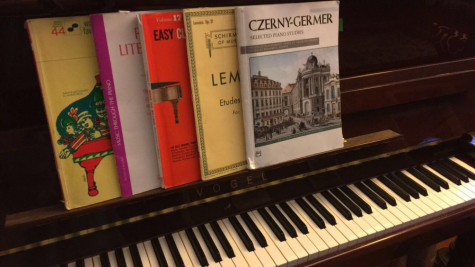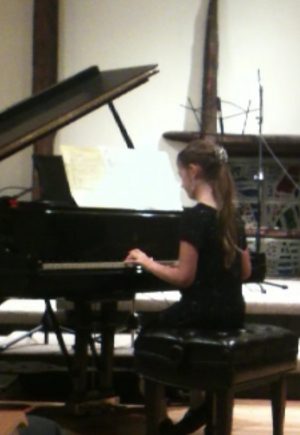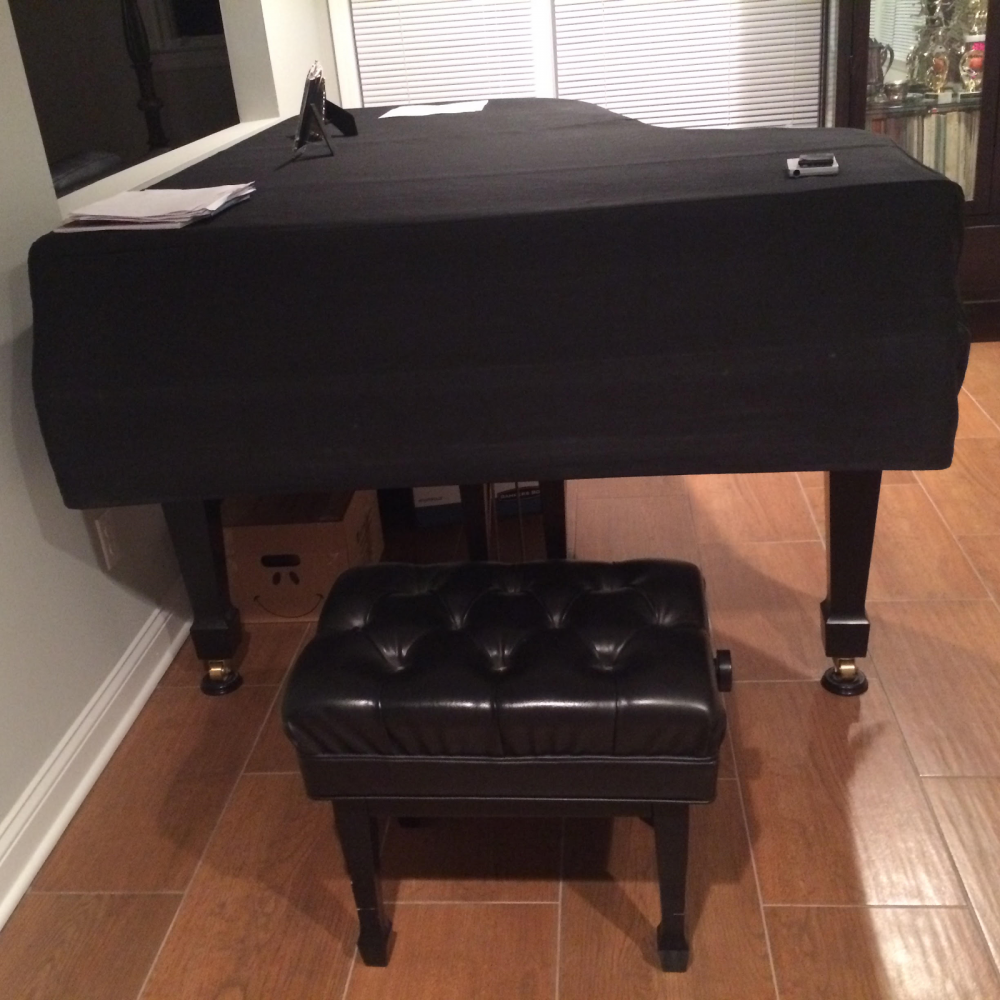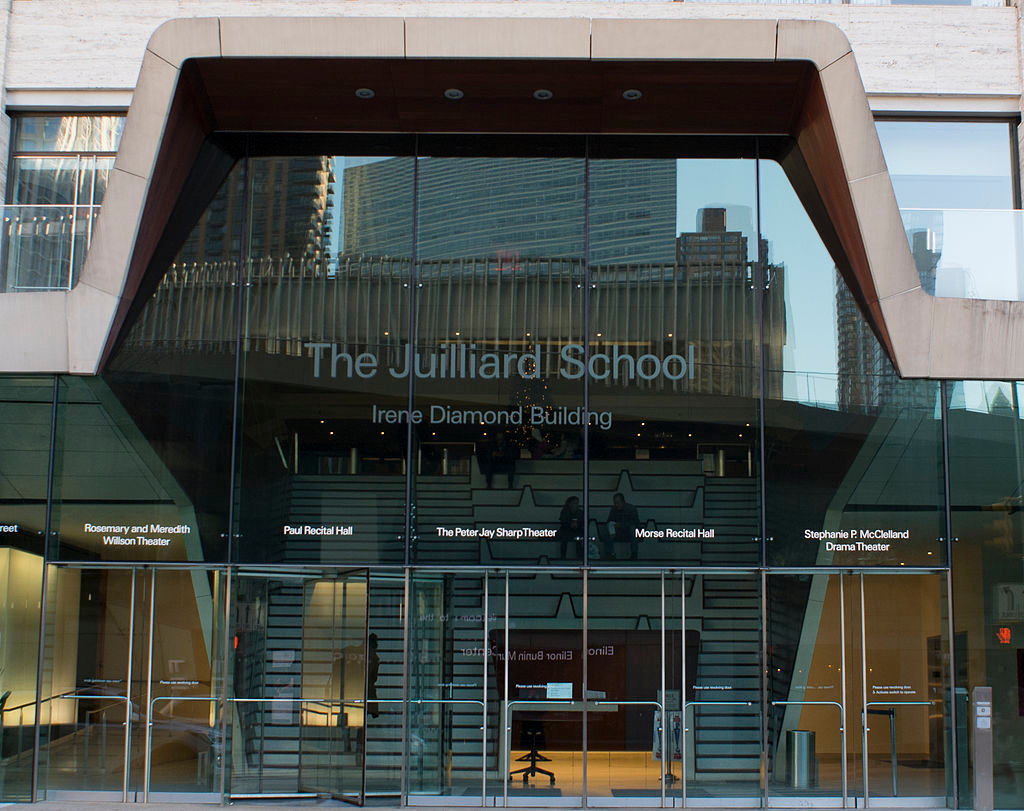Pursuing the melodic dream
April 27, 2017
Five year old Clara Lee sat in her bedroom with the door wide open. From this angle, she could see her parents listening to Korean music, quietly humming along, and slowly waltzing, hand in hand. They glided swiftly across the glossy kitchen floor, like a pair of professional ice skaters at the Olympics.
Clara shut her eyes and imagined herself stranded alone on an immense and radiant stage. A large, lustrous piano was positioned at the center, illuminated by a single spotlight. At first, Clara backed away from it, scared that at any second an audience would appear screaming at her, telling her that she would never be able to successfully play such an elegant piano. Finally, she tiptoed up to the small stool that stood before the intimidating instrument and plopped down.
With a thud, she opened the piano lid revealing the perfectly positioned white and black tiles. They blended together like the stripes on a zebra. Her fragile fingers briskly skimmed the keys and, before she knew it, Clara was playing the piano. Out of the corner of her eye, she saw her mom and dad waltzing to her music.
Clara felt like she could stay in this same spot, playing the piano, for an eternity. But, soon the song died down and she heard applause. Proudly she pressed her hand to her heart, stood up, and bowed.
Her eyes flipped open and she came back to reality. The melody in the kitchen had ended and her parents were laughing and clapping. Clara was no longer on stage; she was back in her cluttered room, staring out the door. For some reason, she was sad and felt like a piece of her was missing. The only thing Clara wanted was to have the same feeling she had had after she finished playing the song in her daydream. At that moment she knew that playing piano was her true calling.
“At first I started learning the basics, like technical pieces such as hannons, etudes, and cherneys. Nowadays there are a lot of beginner books in bookstores. In the olden days, in Korea especially, there weren’t that many books,” she said.
Hannons, etudes, and cherneys are all technical terms for different musical pieces.

Many beginner musicians use books filled with Czerny’s, Etudes, and Scales to enhance their technique. Clara Lee also used these books when she first started her music career and they helped her lay down the basics of her craft.
Clara stared at the five lone piano books stacked in a neat row on her wooden bookshelf. She tugged at the blue one, tied together with red ribbons.
“Hannons,” she read out loud.
She flipped through it, surprised at the fact that there were so many different scales that she would eventually have to learn.
The next book she pulled out was titled Cherney. She remembered hearing about that famous composer and the pieces, now called cherneys, that he composed. She knew that she would soon have to memorize every single note and every little accent mark on each page. The last book Clara pulled down from the shelf was a thin, lavender book with frail pages filled with practice songs. Clara was excited and nervous at the same time for the tough, musical journey she was about to embark on.
“Gradually I improved my technique by practicing, learning scales, and arpeggios. Scales are probably the most important for beginner musicians,” she explained.
Nerves and Notes
In elementary school, Clara eagerly rushed home from school every day to practice. Piano had cast a spell on Clara, and she was mesmerized by every single thing she learned. She practiced three or four hours every day and enjoyed each minute of her personal time playing piano. At 7-years-old Clara was ready to share her talent with others. She performed at her school talent shows and competed in competitions. During her first experiences performing in front of large audiences, Clara learned about the power that nerves had over her. She knew that the way she controlled her nerves would define her performance. She had to stop her hands from trembling, ignore the fluttering swarm of butterflies circling in her stomach, and had to keep herself as calm and collected as possible.
Despite the intervening years, nothing has changed now that Clara is an adult.
“Everybody is nervous before going on stage. So, practice makes you perfect. But, practicing is only one part of performing well,” she explains. “The other is being able to control your mind. It’s good to practice in front of people as much as possible before the concert, so that when you get to the stage you pretend like you are just playing to your family in your room.”
Clara, now 46-years-old, sat backstage, full of nerves, waiting for her turn to accompany her son, Joe Lee, a senior at Glen Rock High School. All of the performers were huddled into a small, waiting room. Fingers twitched, people clenched their sheet music, sweat dripped down hands, and the doors to the practice rooms kept opening and closing, as everyone tried to get in a turn to run over their piece.
The performers were called up on stage, one by one, to play their pieces.
The bright lights were so blinding that only the very first row of red seats, occupied by family members and friends of performers, could be seen from the stage.
Powerful applause and roaring cheers filled the concert hall and echoed off the walls. As the announcer called Clara and Joe’s names, Clara prepared herself for the rush of nerves about to hit. Her heels clacked on the shiny stage and her black dress flowed as she walked up to the piano. She squeezed Joe’s hand one last time as they bowed together. Slowly, Clara sat down on the seat, placing her hands on her lap, and elegantly lifting them up onto the keys. Her heart pounded.
Playing for her son meant a lot to her, and she didn’t want to mess up. Clara began to play, very cautiously at first: she knew that she couldn’t let nerves consume her; she couldn’t let them win. Clara closed her eyes and moved with the music. She pictured her living room and began to relax. The music became more free and the notes poured out of her, like she was the instrument. In her head, she saw her living room. It was so silent that you could hear a pin drop. It had a sense of serenity and peacefulness. The sky blue walls complimented the dazzling, golden sunlight pouring through the windows, illuminating the polished, black Steinway piano in the center. The array of lights on the ceiling were dimmed and the green light on the printer blinked rapidly. A television was on one side of the room, along with a black couch, on which rested a scarlet red blanket. The floor was made up of beige tiles, accented by one, massive, shaggy, grey carpet. Bookshelves filled the empty corners in the spacious room, displaying first place trophies, CDs, family photographs, and old piano books.
Clara opened her eyes, realizing that Joe was already singing the final note of the piece. She held the final chord, letting it resonate with the audience and float through the atmosphere. The chord soon diminished into a soft hum and Clara let out a huge sigh. The audience cheered, applauding like thunder during a wild storm. Clara and Joe walked off the stage with their heads held high and wide smiles across their faces.
Skills of a singing son
Every performer, whether a singer or musician, experiences different emotions before going on stage. Joe Lee, who has a wide music repertoire, finds performances in front of audiences a little nerve-wracking. Somehow, though, he also finds them calming at the same time.
From a young age, Joe had been engrossed in music and the idea of broadening his musical abilities. He experimented with different instruments, one being his voice. He played clarinet for three years, bassoon for three years, and the piano for seven.
“My mom is a professional piano teacher, so she taught me how to play piano. My elementary school teacher taught me how to play clarinet, and I took private lessons with a teacher, Mrs. Herr, to learn to play the bassoon,” Joe said.
After several years of hard work and hours rehearsing, Joe realized that playing three instruments was too much for him to handle. He needed to choose just one instrument to focus on if he really wanted to develop his technique. Joe liked playing bassoon way more than piano and clarinet, so this made the decision quite easy.
“My favorite part about playing bassoon was playing in the Tenafly Jewish Community Center orchestra,” Joe said.
However, even with one instrument, finding time to practice was very tough. After three years of playing the bassoon, Joe believed it was time to take on a new hobby. Joe still had an appreciation for music and had always enjoyed humming along to his favorite KPop and Christian songs as they played from his phone. He decided to try out singing as his new talent.
Joe started taking vocal classes once a week. He learned how to use air properly and efficiently and how to control his breathing. He became a vocal virtuoso, singing in Italian and German, and performing both Broadway and classical pieces, which are very different in style and voice.
“The hardest thing about singing was learning to use my diaphragm, instead of my throat. Also being able to coordinate my whole body for support while performing a piece was very tough to master,” Joe said.
As Joe became proficient at vocals, he was presented with the opportunity to perform at Carnegie Hall. He sang “Amadiu Mia Bella”, accompanied by his mother, Clara Lee, on piano. Joe found the whole experience to be incredibly rewarding and saw it as a major musical accomplishment.
“I love music because I feel like it shows a side of me that people would not normally see. It lets me express myself in a unique way and helps me get my ideas across to people,” he explained. “When I sing, I feel free because I can weave my own style into the piece and make it my own. It is like being taken into a whole different world, so when I listen to music it helps me forget about everything else and focus simply on the notes.”
Joyful in Juilliard
At 10 years old, Clara noticed that she was able to learn quickly and realized that she was talented in music. As Clara got older, her workload got larger, but she continued to keep up her practicing. The hours she spent playing increased and so did the amount of time it took her to do homework. Clara soon concluded that she wouldn’t be able to live without music and made the decision to pursue it as a career. Clara no longer had the old dream (of her parents waltzing to her music) stuck in her head, now she had a new vision. Her one wish was to move to the Unites States to attend the most prestigious, arts school: Juilliard. Every time Clara said the word, she would shudder from anxiety and excitement. Not only the reputation but the culture of the school also intrigued Clara. She loved how close it was to Lincoln Center and Carnegie Hall because she would easily be able to get to any concert from school. She believed that whoever created the college made sure it was positioned perfectly at the heart of music in New York City.
When she turned 24 years old, Clara made the big move from Korea to America. The first thing on her mind was to audition for Juilliard.
“For my audition, I was very nervous. I had to prepare several pieces from different periods of time. One from the classical period, romantic period, contemporary piece., and a few others,” Clara said.
To her surprise, Clara was accepted to the Graduate School at Juilliard. She was ecstatic! Her dream was coming true once again. But, little did Clara know, that she was about to embark on a long, tiresome, thrilling, and music-filled journey, filled with hours of practice and various challenging courses.
Clara would book the special student practice rooms to rehearse almost all day, every day. When she wasn’t tediously running through her pieces, Clara attended classes like music theory, music history, and performance. Clara was especially fascinated by her favorite professor, Abbey Simon, who still performs today.
“He is 97 years old and still alive and still playing the piano. He actually had a performance several days ago. He is a crazy man. I’m still so impressed by him,” Clara said.
After four years of drilling scales, learning the hardest works by the most well-known composers, Clara graduated from Juilliard. The friends that she had made through the years graduated alongside her. Many of them continued on with the music careers to becoming famous musicians, while other took on new jobs and pursued music as a hobby.
“I got to meet a lot of great musicians. I had a lot of good professors. I got to see some of the most amazing performances ever,” Clara said. “I enjoyed music every day and was surrounded by other musicians all the time. I really appreciate that experience.”
The Voice
Music is a passion for many people, no matter where they are from. While Joe Lee’s love of music was passed to him by his mother, other Glen Rock students have their own musical dreams.
Sophomore Gabriella (Gaby) Mangone’s dream has not yet come true, but she has been working hard to make sure it does in the near future. Even as a child, Gaby would listen to famous artists, their top hits booming from the car radio, making the car buzz. She would sing along and picture herself, guitar in hand, belting out the high notes to an original song in front of millions of people. At 11 years old, Gaby got her very first guitar and went straight to work.

For many years, Gaby participated in various shows and musicals at Porchlight, including Shrek, Stage Fright, and Romeo and Juliet. Although she enjoyed singing with the support of an entire cast, Gaby felt that she wanted to show off her own, individual voice.
Gaby’s solo debut was at the middle school talent show, which she performed at for three years. She taught herself the song “La la la” by Naughty Boy and truly realized her passion for music.
“Artists like Sia, Adele, Amy Winehouse, Andra Day, Lady Gaga, and Kehlani have inspired me as artists. I love jazz music along with the mixture of pop and R&B,” Gaby said.
Since her first performance alone, Gaby has sung at events such as, Mobius’s Coffeehouse, the Bergen Academy school, and Relay for Life. Along with these small venues, Gaby made a huge step in her music career by auditioning for a television show: The Voice.
That day, the room was a jumbled mess of high-pitched voices, low, booming tones, harmonies, and nervous chatter. Thousands of people were crowded into that one room, preparing for their auditions. It was claustrophobic and the vibrating windows looked about to shatter from the noise.
The contestants were organized into groups of 10 in an attempt at order, but the space still looked like a blur of unknown faces and different styles. Most people auditioning were about 21 and older, very few individuals were younger than 17. Nevertheless, everyone was eagerly waiting for an opportunity to hear the other contestants’ voices. Some introduced themselves to other people, some sat alone trying to calm themselves down before the big audition. Gaby had been waiting for her turn for hours, quietly running over her audition piece. Finally, Gaby’s group was called in to the audition area. Gaby took in one last breath as she was called up to sing her song, “Rise Up” by Andra Day. One advantage of Gaby’s extensive experience in music at such a young age is her ability to deal with nerves. Although, Gaby does get nervous once in awhile, she never lets it affect her performance.
“I feel safe and free of judgement whenever I sing or play. I allow myself to pour all my deepest emotions into every single piece that I sing,” Gaby said. “I use music as a way to share those emotions with people and allow them to connect with each lyric.”
Since The Voice is a very competitive show, with many amazing singers that audition, Gaby didn’t make it through to the next set of rounds. Only two people from her group were able to proceed on. Despite this setback, Gaby continues with her music and hopes to do something music-related in her future.
“I hope to achieve a career in the music industry after or even during High School. I would love to be an entertainment lawyer in the future,” Gaby said.
Avoiding the Spotlight
Claire Beezley has also been pursuing music from a very young age, but plans on keeping it as a hobby and choosing a different career path for herself.
The first time Claire laid eyes on a piano, she stared at it with wide eyes, fascinated by its beauty. She felt as if the piano were a hypnotizing, mythological siren, luring her into the realm of music with its magnificence. Since then, she’s been mesmerized by the instrument and enjoys playing it in her free time. Claire began playing when she was seven years old.
“The first thing I had to learn was how to read music, which took awhile. I had to learn where the notes were on the piano, how to use both hands while playing, and how to read notes from the bass and treble clef,” Claire recalled.
Despite the fact that Claire doesn’t plan on pursuing music as a career in the future, she takes piano lessons once a week and challenges herself with tough pieces.

10-year-old Claire Beezley plays the piano at her teacher’s annual concert. She was very nervous before the recital and tried her best to distract herself from playing to calm down.
“The piece I’m currently learning, Moonlight Sonata is pretty hard for me. It’s one of the most complicated pieces I’ve ever done so it’s a real challenge,” Claire said. “However, although it is one of my hardest pieces, I think it’s also my favorite piece because of its complexity.”
Claire is one of the many people who experience an extra amount of nerves before going on stage. Claire has only performed at concerts for her parents and teacher, but finds this particularly stressful and doesn’t enjoy this aspect of music.
On the other hand, Claire loves showing her friends her skills. She lights up with happiness whenever she has the chance to play for them because she knows that they won’t judge her and will enjoy the music as much as she does. She also enjoys playing just for herself.
“When I play by myself, it feels very relaxing. I find that music in general is a good way to relieve stress,” Claire said.
On several occasions when no one was home, Claire tiptoed up to the piano stool, quietly rustling through her sheet music, trying to pick out the perfect piece to play. She would start playing quietly and gradually get louder and more expressive. These little moments would bring her so much joy.
“My favorite thing about playing is when I learn a song well enough that I don’t have to concentrate on playing it anymore, so I can play the music more freely and easily,” Claire said. “Being able to play a song perfectly is a great sense of accomplishment.”
The Magic of Music
Many don’t understand the real impact music has on people’s lives, especially the lives of children. Choir teacher Anna Lilikas realized the true power of this art during her years at Syracuse University and made it her mission to spread the magic of music.
“My father has always been the musical one in the family. Every Sunday when my brother and I were little, he used to play his Greek records and cassette tapes and would sing to us while we danced,”Lilikas explained.
Four-year-old Lilikas prepared herself for her very first recital at her Pre-K graduation. She walked up on stage, proudly and happily, singing “Itsy Bitsy Spider.” Satisfied with her performance, Lilikas looked out into the audience, waved and smiled at her parents.
In middle school, Lilikas played the flute, piano and even sang in her school choir. Although she was well-ranged in different areas of music, Lilikas only began taking voice lessons in college.
She attended Syracuse University where she received a Bachelor’s Degree in Music Education, as well as Communication Sciences and Disorders, and her Masters in Music Education.
Along with many courses that she had to take to graduate, Lilikas participated in several activities that changed her perception of music forever.
“I was in all of the choirs in college as well as part of First Year Players, which is a student run musical theatre organization. I was also involved in the acapella groups and served as President of one of my choirs as well. I also had voice students and directed my own choir in the city of Syracuse,” Lilikas explained.
In college, Lilikas was taught about the importance of speech in music. For all singers, it is significant to understand the meaning of what they are singing to be able to express the point of the piece to the audience.
“I remember that my teacher made learning fun, yet always had an educational objective that she was trying to reach. Something that my voice teacher used to always tell me was that singing is just elongated speech on pitch, if you can speak you can sing,” Lilikas said. “She would also have me speak and understand the text first, especially if it was in another language, before I sang. “
Lilikas took part in numerous choral competitions in college. One of the best competitions Lilikas went to was an international competition in France, where her choir won first place. Additionally to performing in France,Lilikas has traveled to many other countries, sharing her talent with the world. She has performed in France, Argentina, Uruguay, Poland, Germany, Chile, Toronto, Italy, Austria, Switzerland, Boston, DC, New York City, and Chicago.
To be such a successful performer, like Lilikas was, required a lot of hard work.
“In college, I would practice almost every day for about two hours. I usually would take a break every half hour to mentally recharge and not overuse my voice,” Lilikas said. “The breaks also helped if I was frustrated or having difficulty with a certain section of music because it allowed an opportunity to think of another approach to the problem.”
These long practice hours were especially beneficial for Lilikas because they helped her learn to control her nerves. According to Lilikas, the best way to deal with stage fright is to keep performing. The more times someone performs, the less scary it becomes.
After graduating college, Lilikas worked as an assistant musical director, voice teacher, piano teacher, and choir director. She also created a curriculum with for an inner city program about music and literacy. All of her college experiences, her passion for music and teaching, and these jobs led her to a career as a choir teacher at Glen Rock High School.
Lilikas comes to work every day, happy to be teaching students the unique culture of music that they otherwise wouldn’t have known about.
“I love being a choir teacher because chorus is unlike any other class. It allows students to interact with people in other grades and be part of something much bigger than themselves. I also love that I have most students for more than a year because you get to see them grow and become great people,” Lilikas said.
Lilikas saw what an impact music had on her life and knows that it can do the same to many other students.
“I think that music is essential and it allows people to express themselves. Music is everywhere even if you don’t realize it,” Lilikas revealed. “Music is for everyone. It connects the whole world. It heals and brings people together.”

For Clara Lee, her living room is her favorite place to practice music and focus on making them as expressive and technically perfect as possible. She prepared herself emotionally in this living room for a huge concert in Carnegie Hall in February last year.
Closing the piano lid
After graduating her dream school, Clara Lee participated in several chamber orchestras. In addition, she wanted to spread her knowledge about the art of playing piano, and became a professional piano teacher. She has had about 100 students who have come to her home to learn. She enjoyed working with younger kids and showing them everything she had been taught in the past.
One of the most important lessons that Clara likes to teach is the art of expression while playing a piece. Many may not realize this, but playing any instrument is not only about memorizing notes and playing the piece to an audience, it is also about knowing the history behind the sheet music. It is about discovering the feelings the composer had when creating the piece and being able to access those emotions while playing in front of an audience.
“A big part of playing piano is being able to interpret every piece of music. I have to be like an actor. An actor reads a scene, memorizes the lines, and then they make their emotions come out. Interpretation requires a lot of creativity. So, a piano performance is very similar,” Clara explained.
Clara’s teaching career has been put on pause because it is an incredible demanding job and huge time-commitment.
“It got hard to pursue my career and stay connected with my family. So, right now, I am taking a break,” Clara said.
The piano in her living room stands untouched, with the lid completely shut. The lights in the room are turned off, and the bookshelves are covered with a layer of dust. The weather outside is misty and full of fog, making it tough to see. A thin ray of light protrudes through the cloudy glass window, shining over the piano.
Just like that single ray of sunlight, Clara’s love for music will never stop and will “shine” through, even on the most gloomy days. Music has become such a big part of Clara’s life and can never be taken away from her.
“Piano has a treble clef and a bass clef. That means you use both parts, the melody and accompaniment. So these two different parts are brought together by the piano,” Clara expressed. “It is the only instrument that makes a harmony and that why I love it. It’s very unique for that reason.”
Although all musicians have their own musical experiences and stories to tell, they all have one thing in common and that is their love for music. Music is a powerful, unifying force that brings people of different age, experience, and character together.
